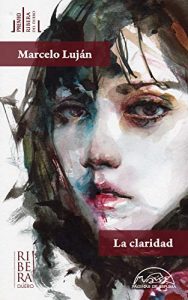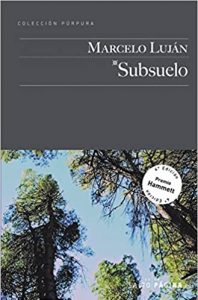I will always defend the story as an alternative source where I can refresh myself with revealing readings, about the profession of writing itself or as a boast of its capacity for explosive Pandora's box synthesis. Because today the story has gained relevance, it has matured, it has spread to older readers but more than ever eager for transformative tales of boredom.
A Marcelo lujan, to his stories, I got to know them thanks to his book of short stories «The clarity», with his brand new vitola of Ribera del Duero award. An award already shared with her predecessor and compatriot Samantha Schweblin, perhaps the final accolade to cheer me up with his "quality."
But you immediately discover in Luján that trace of a narrator of the inspired brief. The storyteller touched by the gift that is capable of being tamed in its unbridled imprint, ends up allowing himself to be balanced with the rational to end up becoming visible in the most beautiful and transcendent of forms.
Also in Luján's novels we find interesting plots that border the black gender, atomized at times with the fondness of the storyteller who always wants to impose himself. But Luján also makes trends a virtue and in any of his books one can enjoy a literature made soul.
Top 3 recommended books by Marcelo Luján
The clarity
From the cave the clarity is observed with suspicion. At the end of the day we are all there, among the shadows, due to fear or guilt. Faced with the self-defense of our pettiness, light can do little.
And then clarity can be even threatening if we insist on staying in the dark. Plato and his myth of the cave, characters in this book who were perhaps one of the few intrepid ones who could reach clarity when all is lost.
The six stories that constitute The clarity they announce everything we want and cannot achieve, fears and raptures, love and betrayal and the tiny moments of happiness. The brightness of clarity is brightest when viewed from darkness.
And it is, precisely, from that broad parameter of blackness, where a particular and resolute handling of language, narrative voice and registers, manages to create free or condemned characters, always eternal, in unexpected, extraordinary, violent and earthly that combine to show us the sharper side of beauty.
Subfloor:
This story takes advantage of the fact that everything is finally fragments. Life is those pieces of us and of what we have lived, in a puzzle where essential pieces are always missing. A plot in search of those pieces to try to explain the reasons for the darkest and most tortuous memories.
A living body that is exchanged for a corpse. A pool. A flash. The swamp. And the twins, who share a secret that does not seem easy to escape. Like a murmur under the centuries-old earth, the adolescent indifference can be seen truncated by the calm of the water; just a moment inside that night that sweats poison. Family, memories, past. Ants.
The hidden roots that are always present and so active: tightening the muscle of the sentence. Like the two-handed pulse that forces suicidal solutions. Like the umbilical cord that joins and separates, that ties and tightens. To death. Even guilt. Two summers are enough for the parcel of the valley to become the scene of a perfect emotional torture.
Moravia
Argentina, February 1950. Juan Kosic, now established and famous bandoneon player, returns to his native place fifteen years after leaving it. His wife and his little daughter accompany him. Without revealing his identity, he shows up at the boarding house that his mother has run for more than forty years in Colonia Buen Respiro, a town lost in the middle of La Pampa. For Juan Kosic, his long-awaited return has only one purpose: to demonstrate to his mother that he succeeded thanks to the profession that she had denied him and that one day forced his separation from her.
Wealthy in a peasant town with scarce resources, elegant and bombastic, loaded with the arrogance that only resentment can generate, the bandoneon player ignores all the warnings of his wife and does not give up on continuing with the plan that he has been devising for years: making fun of who she did not trust him or his artistic talent.
But an irreversible and catastrophic event will lead history on a tragic detour. With his narrative talent unanimously praised by critics, Luján reflects on the risks of imposture and the destructive capacity of the human being when, as in Greek tragedies, hubris and ambition push the characters towards a dramatic outcome.



